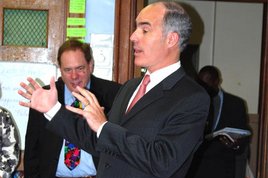The governing body of the Philadelphia School District last month approved new guidelines that seek to curb school bullying.
The five-member School Reform Commission endorsed updates that lay down specific definitions of and procedures to deal with bullying and cyberbullying at its Sept. 22 meeting.
The district has had an anti-bullying policy in place since December 2008, but SRC commissioner Johnny Irizarry said the new rules are much more effective.
“It’s a lot more specific,” he said. “It has actual process in it, with the reporting, the investigations, the consequences. There’s a lot more clarity.”
The policy is also much clearer on anti-LGBT bullying.
Irizarry said the district’s anti-harassment policy already spelled out in its definition that acts of harassment may be motivated by one’s sexual orientation or gender identity, along with a series of other characteristics, but such a stipulation was not explicit in the anti-bullying policy.
“We wanted to have language that mentioned things like race, age, sexual orientation, gender identity specifically,” Irizarry said. “Even though the state doesn’t require that, we thought it was important to have it included in our version. It’s almost like, if it ain’t written, nobody’s going to think about it.”
Irizarry noted that when the commission was previously looking into issues impacting the African-American and Latino communities, they visited The Attic Youth Center and saw firsthand the effects anti-gay bullying can have on students.
“One of the top issues that came up when we spoke to them was the bullying,” he said. “They told us lots of interesting stories that day, not only of what they experienced and how they tried to deal with it, but also how they often tried to hide their identities just so people wouldn’t harass them or be friends with people they wouldn’t normally be friends with just to avoid the bullying.”
Gloria Casarez, the city’s director of LGBT affairs, said the amended policy is also noteworthy for the definitive procedures that are spelled out.
“What makes this different from other anti-bullying policies that are out there is that this does have clear consequences that are laid out,” she said. “These are real consequences that are written, so it’s a little bit different because not all policies actually say that.”
In the policy, bullying is defined as “intentional electronic, written, verbal, nonverbal, psychological or physicals acts” directed toward a student, either in or outside a school setting that is “severe, persistent or pervasive.” Acts of bullying are described as resulting in an interference with a student’s education, the creation of a threatening environment and/or a substantial disruption of the orderly operation of the school.
The updated policy takes into account recent technological developments that have fueled youth bullying — such as the recent situation at Rutgers University in which freshman Tyler Clementi was outed via a webcam activated by his roommate while he was having a sexual encounter with another man — referring to bullying carried out through a nonverbal medium such as e-mail, instant messaging, text messaging, blogs, photo and video sharing, chat rooms or websites.
Students and/or parents are encouraged to report any instances of bullying to school personnel like the principal, teachers, guidance counselors, coaches or administrators, and any staff members who receive such a report must notify the school principal. School employees who witness bullying are required to report such situations to the principal.
The principal is then mandated to investigate such a complaint and may interview the complainant, accused or others with knowledge of the incident.
If the principal determines that a policy violation occurred, he or she is required to inform the offending student and his/her parents of the violation and review the anti-bullying policy with them. Consequences for the first offense include the parental notification and a documented warning, while second offenses could lead to loss of school privileges, detention, exclusion from school activities and/or counseling. Third offenses would result in suspension or transfer to another classroom, building or school bus. The policy also describes that, if the first offense is “notably severe,” a student could be suspended for four-10 days, expelled or referred for placement in an alternative-education program.
The guidelines mandate that the bullying policy and procedures are reviewed each year with students, staff and parents, and that a copy is accessible in every classroom and posted in a prominent location in each city school. The policy also requires that the annual Safe School Report include statistics on bullying incidents, along with a report on the development of any bullying-prevention programs.
Jen Colletta can be reached at [email protected].
